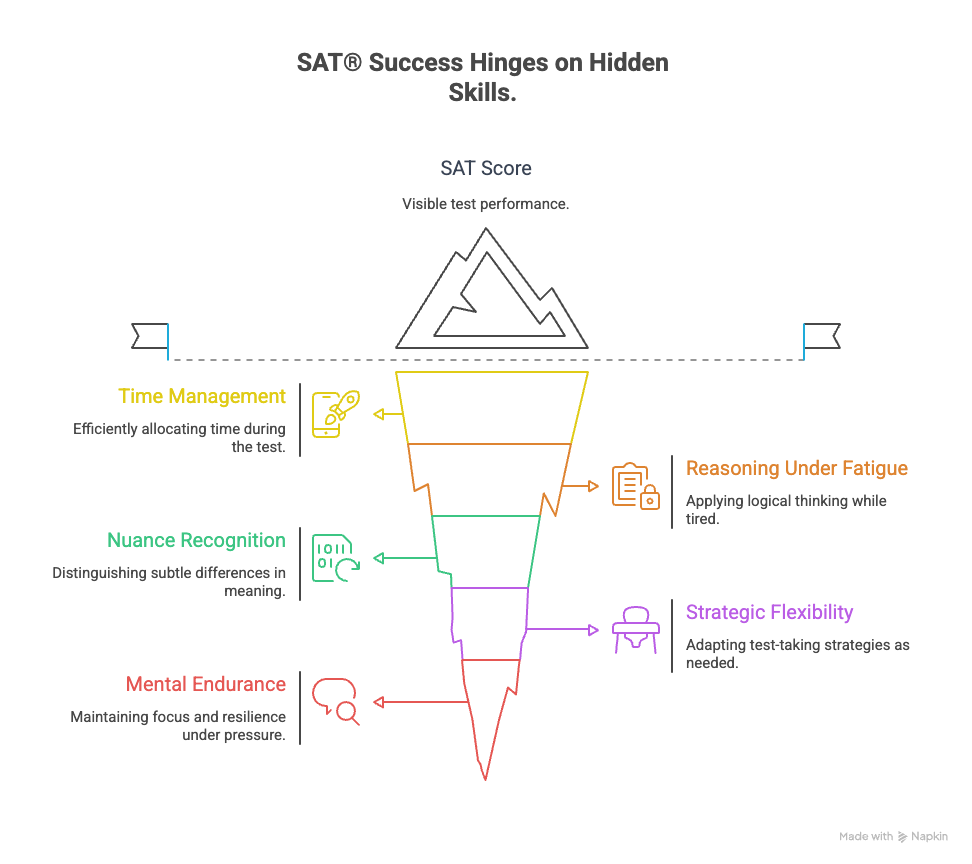Most advice on test prep focuses on what to study or how much. But very few talk about when. And yet, for students preparing for high-stakes exams like the SAT®, ACT®, APs®, or competitive entrance tests, timing might be the most underrated performance multiplier.
You don’t need more time. You need better alignment between your brain and your calendar for effective SAT® prep.
Your Brain Has a Clock, and You Should Use It for SAT® Study Strategies
Teen brains aren’t lazy. They’re just wired differently. The prefrontal cortex, the part of your brain responsible for logic, focus, and self-regulation, is still developing into your mid-20s. It’s also the slowest to wake up. That’s why many teenagers struggle to think clearly first thing in the morning.
According to a 2012 study published in Nature Communications, adolescents experience a delayed circadian rhythm; their natural “alertness window” starts 2-3 hours later than adults (Hagenauer et al., 2012). This isn’t a character flaw. It’s physiology.
What does this mean for your SAT® study strategies? It means studying smart has just as much to do with when you do the work as what work you’re doing. This understanding is key to improving your SAT® and mental resilience.
Here Are 5 Real Situations Where When Matters for Your SAT® Prep
1. Do Heavy Thinking Late Afternoon (4-6 PM)
Best for: Math problem sets, grammar editing, reading comprehension
During this window, your analytical brain is sharpest.
Studies in Cognition show that decision-making speed and accuracy are highest in the late afternoon for teens.
If you’ve ever struggled through math at 10 PM and blamed yourself—it probably wasn’t you. It was your clock.
Try this: One hour after school. No distractions. Just your hardest tasks. Your thinking becomes more lucid and your answers more precise for challenging SAT® questions.
2. Review Flashcards or Notes in the Morning
Best for: Vocabulary, formulas, foreign language, grammar rules
The morning is ideal for short-term memory.
Even if you’re not a morning person, your brain is good at handling light recall tasks early in the day.
This is a solid SAT® study strategy for memorization.
Try this: 10-minute review blocks between classes or during homeroom. Micro-moments matter. You’ll reinforce memory through repetition, not tenuous late-night efforts, improving your SAT® vocabulary and formula recall.
3. Take Practice Tests Mid-Morning on Weekends
Best for: Simulating test-day performance
The SAT® starts at 8 a.m., but your brain doesn’t.
Practicing at 10 or 11 a.m. aligns better with your natural rhythm and gives you an honest read on performance.
This approach enhances your SAT® and mental resilience by reducing early morning stress.
Try this: Take practice SAT® tests at 10:30 a.m. through most of your prep. Simulate the 8 a.m. condition only in the last 2-3 weeks. You’ll feel more resilient, not from overtraining, but from being synchronized with your own cognitive rhythm.
4. Do Cleanup Tasks in the Evening
Best for: Reviewing mistakes, organizing notes, making study plans
Executive function weakens at night.
Don’t waste that time on new learning. Use it to reflect and regroup.
This is a practical SAT® study strategy for winding down.
Try this: Revisit missed SAT® questions and correct your logic. Plan the next day. Then stop. This is a good time for introspection and to synthesize what you’ve already worked on.
5. Sleep on It - Literally
Best for: Getting unstuck on a hard concept
Your brain continues processing problems even while you sleep.
This is known as the incubation effect, and it’s real. Especially during REM cycles, the brain finds patterns and stores insight.
This contributes significantly to your SAT® and mental resilience.
Try this: Skim a tough problem. Stop. Sleep. Revisit the next morning. Let your mind gestate the idea without force.
.png)





